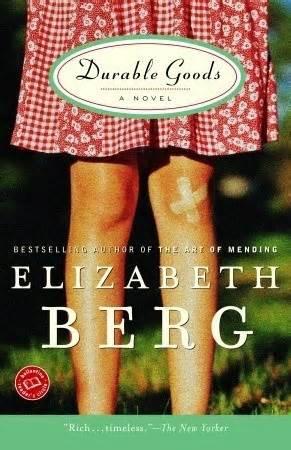
Durable Goods by Elizabeth Berg. Ballantine. (2003)
I owe a debt of gratitude to Elizabeth Berg for twice making public appearances at my request, her kindness doing much to raise my professional reputation. She’s more than a big star on my work report card; she’s also a warm, hilariously funny and generous human being who has written a whole lot of books about the drama found in everyday life.
Since she’s been so good to me, I felt it was high time I read one of her works. When I wasn’t sure which of her books to start with, I decided to take on the book she said was her favorite, Durable Goods, one of her earlier novels.
The book’s about a military family: a father and two daughters – Diane and Katie. Their mother having died of cancer, Diane and Katie are left to navigate adolescence with the help of friends and each other.
Their father is a violent man, quick to anger. The sisters have endured verbal and physical abuse at his hands, during their mother’s life and after. Both have turned to friends as a means of getting out of the house and out from underfoot but they move so often, from military base to military base, the process of making friends is an ongoing, uphill battle.
At the heart of Durable Goods the family is living in Texas. They’ve been in one place long enough Diane has formed a serious relationship with her boyfriend and Katie’s become close with her friend, Cherylanne, with whom she shares everything. After attempting to run away once, brought home by Military Police, Diane has earned untouchable status while putting a crack in their father’s overbearing facade. When he announces the family is moving yet again, both girls are devastated. And this is what precipitates the climax of the book.
Berg writes for women, in the voice of women and about aspects of life that generally fall into the female realm.The heavy truths are there, more between the lines than specifically expressed. The violent and upsetting scenes take place behind closed doors, in other rooms. The reader knows what’s happening but isn’t actually in the moment.
Her style is minimalist, conveying serious topics without becoming engaged in the battle. She’s more a concerned observer, relating the story without taking a side. As a result, her characters are presented without judgment, good and bad qualities laid out for the reader to determine. Few people are either all good or bad and Berg has developed her writing to highlight this. This is perhaps her biggest strength as an author, judging only from this one work I’ve now read. It’s what struck me, what impressed me most about the way she uses words.
I like her for the kind, funny and generous person she is and appreciate her support of libraries and reading and was pleasantly surprised by the irreverence of her humor in “real life.” She’s just a joy.
